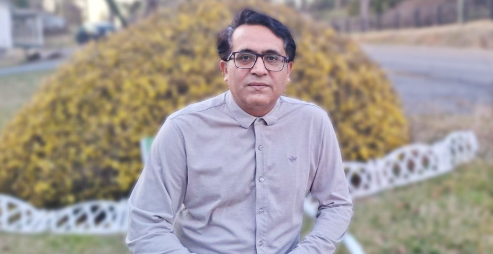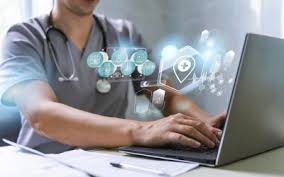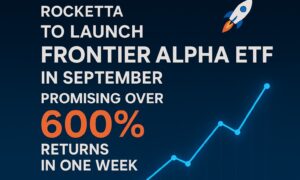The global healthcare industry is changing with the use of Artificial Intelligence (AI). According to Grand View Research, the AI in healthcare market is expected to reach $120.2 billion by 2028, growing at a rate of 41.8% per year from 2021 to 2028. This growth is driven by the need for better diagnosis, personalized treatments, and efficient patient care. In the United States, AI is being used for predictive analysis and robot-assisted surgeries. In countries like Pakistan, AI is improving telemedicine and electronic health records.
Muhammad Humair Noor is a Health IT Architect Specialist with more than 20 years of experience. He is currently the Manager of Integrations at F3 Technologies. Humair has played a key role in developing healthcare solutions using FHIR, HL7, and RESTful APIs. His work has improved New Zealand’s healthcare system and supported digital healthcare projects in different countries. He has also contributed to Agile methodologies. As Pakistan’s Secretary for the first Agile Conference with Scrum Alliance, he trained more than 200 developers and helped change IT team management in the region.
In this interview, we explore Humair Noor’s journey, his contributions to AI in healthcare, and his vision for the future.
Humair, your career spans over two decades in healthcare technology. What led you to focus on AI in this field?
I started my career in the early 2000s at MTBC, now CareCloud, where I worked on Electronic Health Records (EHR) and insurance claim processing. I became interested in interoperability when I faced challenges in ensuring smooth data exchange between different systems.As AI gained prominence, I recognized its potential to address these challenges and chose to specialize in AI-driven healthcare solutions.
As Manager of Integrations at F3 Technologies, how have your projects in AI and interoperability helped healthcare systems worldwide?
At F3 Technologies, I lead projects using FHIR and HL7 to improve communication between healthcare providers. One key project was the CanShare initiative by the New Zealand Ministry of Health, which helps share cancer patient data. We also worked on COVID-19 messaging systems for real-time pandemic response. These projects have improved decision-making, automated workflows, and made patient care better in countries like New Zealand, Australia, UAE, and South Africa.
Can you highlight some of your most important achievements in healthcare technology?
Over the years, I have worked to connect technology with patient care. In New Zealand’s CanShare project, I structured oncology reports and treatment plans using FHIR, reducing duplicate tests by 30% and speeding up treatment. During the COVID-19 pandemic, I helped integrate HL7 messaging for real-time lab result reporting across the country, cutting data turnaround times from days to hours. I also led the development of Raurau Ngaehe, an AI-driven cancer management system that replaced manual workflows with digital tools. My work on ONC-certified FHIR architectures in the US has improved secure patient data sharing. My contributions to New Zealand’s FHIR Work Group have influenced national healthcare policies. As a result, Valentia Technologies healthcare platform INDICI was recognized with the APICTA 2022 Merit Award. Additionally, I played an important role in Agile Project Management as Pakistan’s Secretary for the first Agile Conference.
As a leader at F3 Technologies, how have you influenced the company’s healthcare innovation strategy?
I believe leadership is about empowering teams to work together. At F3 Technologies, I manage teams working on HL7, FHIR, and cloud-based healthcare solutions. In the Raurau Ngaehe project, I introduced agile workflows that reduced diagnostic errors by 22% and built trust in AI-driven tools. I also worked with government bodies like the New Zealand Ministry of Health’s Te Aho o Te Kahu, Te Whatu Ora and ACT-Now to ensure compliance with HISO (Health Information Standards Organisation) regulations while promoting innovation. I have set up coding guidelines and training programs that have reduced integration errors by 35%. By encouraging a culture that sees compliance as a foundation for innovation, we have secured multi-million-dollar contracts and established F3 Technologies as a leader in healthcare technology.
Your research spans various healthcare technologies and data integration strategies. Can you highlight some key publications that reflect your contributions to AI-driven healthcare innovation?
AI with Quantum Computing is going to change the world, especially in healthcare, by revolutionizing data integration, predictive analytics, and decision-making. My research on Quantum Computing Applications in AI for Fraud Detection explores how quantum-enhanced AI models can improve anomaly detection in medical billing, insurance fraud, and electronic health records, ensuring data integrity and security. In AI-Enhanced Quantum Algorithm Design, I reviewed machine learning techniques that optimize quantum circuits, which can enhance medical imaging, genomic analysis, and drug discovery by processing vast datasets more efficiently. Additionally, my work on A Taxonomy of Modern Quantum Computing maps AI-quantum integration, offering a framework for real-time healthcare data interoperability and predictive analytics for personalized medicine. These contributions demonstrate how AI and quantum computing will transform healthcare by enabling faster, more accurate, and scalable data-driven solutions.
What initiatives have you led to develop talent and research collaborations in Pakistan?
Recognizing the need for innovation in project management, I launched Pakistan’s first Agile Conference to introduce Agile methodologies to industries still reliant on traditional approaches. This initiative created a platform for professionals across sectors to learn, collaborate, and integrate Agile practices to enhance project efficiency.
Through Agile Pakistan, we built a self-sustaining community dedicated to education, mentorship, and knowledge-sharing. By training teams, supporting startups, and collaborating with established businesses, we helped drive a shift toward a more adaptive and responsive work culture in Pakistan’s tech industry. Mentorship has been at the core of this journey—when experienced professionals share their expertise, it creates a ripple effect that strengthens the entire industry.
Mr. Humair Noor, you’ve consistently demonstrated a strong commitment to advancing your technical expertise through certifications. Could you elaborate on some of your key achievements in this area and how they have contributed to your professional growth?
Certainly! I believe continuous learning is vital in staying ahead in the ever-evolving tech landscape. One of my notable certifications is the Comprehensive HL7 FHIR Proficiency Exam Preparation Course from Health Level Seven International (HL7.org). This certification deepened my understanding of Fast Healthcare Interoperability Resources (FHIR), a crucial standard in healthcare data exchange. I’m particularly proud to have secured an impressive 95.6% score in the FHIR certification exam. I strongly believe that FHIR will transcend its current role in healthcare and emerge as a universal data standard, redefining how industries manage data interoperability and integration. Additionally, I earned the Certified DevOps Security Practitioner (CDSP) certification after successfully completing comprehensive training conducted on October 18th, 19th, and 20th, 2021. This certification equipped me with key skills in securing DevOps pipelines, reinforcing my expertise in implementing secure software delivery practices. These certifications reflect my dedication to mastering emerging technologies and ensuring I bring the most up-to-date knowledge to my professional endeavors.
What are your future goals in AI and healthcare technology?
I want to expand AI-driven healthcare solutions worldwide, contribute to AI health policies, and make Pakistan a leader in AI healthcare by training local talent and building international partnerships. I focus on three key areas: interoperability, predictive AI, and accessibility. We are working on international patient summary standards to support expats in Qatar and the UAE. AI will move from diagnosing diseases to preventing them. We are also testing low-cost FHIR solutions. The future of healthcare should not be limited to a few. It should be accessible to all.
Muhammad Humair Noor’s work is shaping the future of healthcare technology. His contributions show that AI-driven healthcare is not just for developed countries. It is also making a difference in places like rural Punjab, Dubai, and beyond. His leadership ensures that AI helps build smarter, more connected, and patient-centered healthcare systems worldwide.

